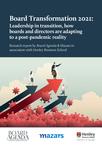
Board Transformation survey report: Leadership in transition - adapting to a post-pandemic reality
Findings reveal a boardroom community that is embracing change, increasing oversight of employee issues, focusing on the long-term resilience of the organisation, and giving equal weighting to risk management on the one hand and the opportunities for digital transformation on the other.
Leadership style and culture have come into focus, with a significant number of respondents recognising the need for transformation and to review capabilities. They have also shown themselves to be agile and able to transform at speed, having been forced to work remotely along with the rest of their workforce, as well as witnessing how other family members are coping with their own working challenges.
Responses came from 270 senior business leaders, including board chairs, chief executive officers, chief financial officers, chief operating officers, chief risk officers, executive and non-executive directors, and company secretaries – from a broad range of industries, across the globe.
Key findings
- Eight out of 10 boards (82%) are strengthening their employee wellbeing policies as a direct result of the pandemic.
- Nearly two-thirds (63%) agree that feedback on engagement with their workforce has improved since the onset of the pandemic.
- More than half (56%) of boards have made substantial changes to the structure or operations of the business while nearly three-quarters have increased its long-term resilience.
- Risk management and resilience topped the board’s agenda alongside digital transformation.
- Some 77% of respondents feel their boards have had the necessary agility to navigate changed priorities, though nearly half (48%) say there needs to be a review of boardroom capabilities.
- 43% are in favour of a change in leadership style.
- Two-thirds (66%) say engagement between board and senior management has been improved.
- 47% say that investor engagement has been improved.
- 58% agree the need for greater emphasis on ESG.
- Half (50%) say they are making changes to long-term liquidity, credit, and capital.
„Businesses have been forced to transform at an unprecedent speed because of the pandemic. Some transformations may have been long predicted and merely accelerated, while others have been unexpected. But all have been disruptive, both positively and negatively. A trend that is evidenced in our survey findings and has impacted local business as well is the growing appreciation of the evolving needs of the organisation and its people. The leaders should now be considering how to further strengthen engagement and motivation with employees to get the most out of new ways of working.
The positive impact that prioritising both environmental and social issues can have on an organisation is also a key aspect to be considered by business and their Boards. Finding the right strategy to significantly transform and increase the pace of change while building its positive contribution to society and environment will give businesses the necessary resilience to grow further”.
Răzvan Butucaru, Partner, Financial Services and Advisory Leader, Mazars Romania.

